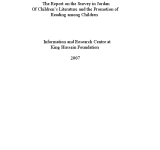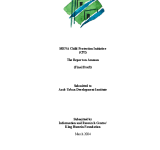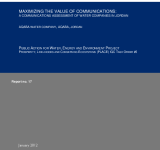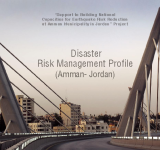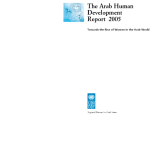والثقافة
This report aims to review the status of children in Greater Amman and to conduct a capacity assessment of key institutions addressing children’s issues. Various issues are examined;; covering areas such as health;; education;; and socio-economic characteristics. This report also reviews the status of disadvantaged children;; including working children;; orphans;; refugees;; and children with disabilities;; in order to identify vulnerabilities and risk factors specific to them. Finally;; this report assesses the capacity of selected institutions addressing children’s issues in Greater Amman and proposes phased capacity building programs based on the findings of the assessment.
This report surveys children’s literature in the Arab Republic of Egypt and the promotion of child literacy. The survey examines the promotion of children’s literature through various axis;; including official state policies;; the role of the private sector;; and the role of institutions and national programs in promoting child literacy. The report also examines Egypt’s childhood education system;; the quality and distribution of public libraries throughout Egypt;; and the nature of the publishing industry. Finally;; this report makes a number of recommendations which aim to further promote literacy among children in Egypt.
This report concerns the results of a survey on children’s literature and the promotion of reading in Palestine as represented by the West Bank and the Gaze Sector. Emphasis is placed on a number of axes regarding children’s literature;; including policies and legislation;; programs and institutions;; libraries;; elementary schools and universities;; and the publishing and distribution of children’s books. Upon analysis of the state of children’s literature in Palestine;; this report identifies certain trends regarding child culture. It also identifies a number of problems facing the promotion of reading among children;; including financial constraints;; the quality and availability of libraries;; and the overarching challenges influenced by Israel occupation.
This report concerns the results of a survey on children’s literature and the promotion of reading in Syria. Emphasis is placed on a number of axes regarding children’s literature;; including policies and legislation;; programs and institutions;; libraries;; elementary schools and universities;; and general information regarding children’s books. Upon analysis of the state of children’s literature in Syria;; this report identifies certain trends regarding children's literature. It also identifies a number of problems facing the promotion of reading among children and makes a number of recommendations for the development and improvement of children’s literature.
The report is based on the study designed to conduct a communications assessment of Aqaba Water Company;; one of the key water utilities in Jordan and to examine how its communications department collaborates with other areas of the organization. As part of the Public Action for Water;; Energy and Environment Project (PAP);; a public education and behavior change communication program developed to support USAID’s technical and policy investments in the Jordanian water and energy sectors;; the report finds that the effective communications can save the utility money by improving operations;; increasing efficiencies and reducing customer complaints. The report suggests that the strategic communications can be the key to a sustainable future for the kingdom during the times of critical resource constraints and presents some guiding principles and recommendations for the Aqaba Water Company’s communication efforts.
This report was prepared by the General Directorate of Civil Defense and the United Nations Development Programme in 2008. It provides an overview of Jordan and its demographic;; economic;; social and cultural characteristics. In addition it presents legislation and its effectiveness;; relevant to land use management;; vulnerability to hazards and the disaster risk management arrangements in place. It concludes with the disaster risk management vision of Jordan.
This report presents a compelling argument as to why realising the full potential of Arab women is an indispensable prerequisite for development in all Arab states. It argues persuasively that the long hoped-for Arab “renaissance” cannot and will not be accomplished unless the obstacles preventing women from enjoying their human rights and contributing more fully to development are eliminated and replaced with greater access to the “tools” of development;; including education and healthcare. By placing Arab women firmly in the centre of social;; cultural;; economic and political development in the entire region;; the Report goes beyond arguing that half the population deserves half the participation. In fact;; it asserts that irrespective of the numbers;; Arab women have already accomplished great strides that are transforming the region’s political economy and social demography. While lauding these achievements and making a strong case for facilitating this strong current of positive social transformation;; the Report also analyses the remaining impediments;; and suggests concrete steps towards their elimination.
